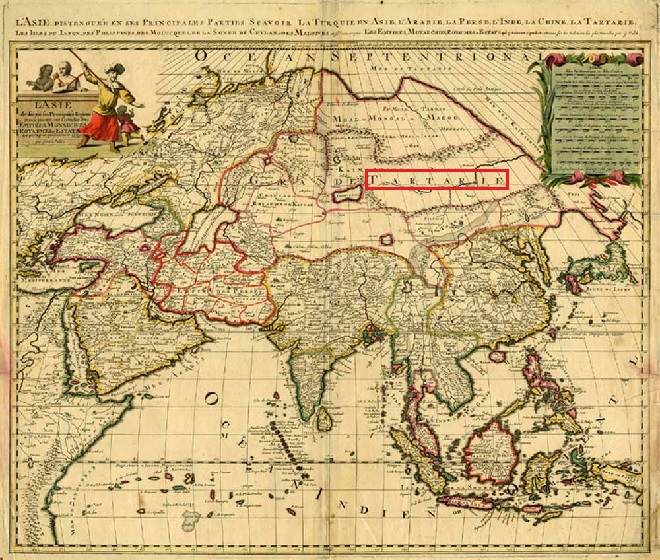 |
| Domain of the khan of Tartary |
The Trump lawyers build on their merits brief in the related cases of congressional subpoenas embracing Judge Neomi Rao's assertion that three Congressional committee subpoenas for Trump's tax and financial records are invalid because the House had not invoked its subpoena power. In the challenge to the New York grand jury subpoena they claim now that the House of Representatives "sole power of impeachment" is the exclusive remedy for presidential misconduct. Article I, Section 3 which permits prosecution after impeachment and conviction is now said to bar even criminal investigation of a President while s/he is in office. The Trump lawyers assert:
The remedy for wrongdoing by the President is impeachment, not criminal prosecution. U.S. Const. art. II, §§1, 4. That is why the Constitution provides that only after he is “convicted” by the Senate may the President then be “liable and subject to Indictment, Trial, Judgment, and Punishment, according to Law.” Id. art. I, §3. The President is thus “beyond the reach of any other department except in the mode prescribed by the constitution through the impeaching power.” Kendall v. U.S. ex rel. Stokes, 37 U.S. (12 Pet.) 524, 610 (1838).
Evoking their earlier argument that the New York District Attorney, like the other 2,300 county prosecutors, poses a threat like the Lilliputians did to Gulliver Messrs. Sekulow, et alii further urge:
“No single prosecutor, judge, or jury should be able to accomplish what the Constitution assigns to the Congress.” Brett M. Kavanaugh, Separation of Powers During the Forty-Fourth Presidency and Beyond, 93 Minn. L. Rev. 1454, 1462 (2009). This was also how the Framers understood the Constitution. “The President,” Alexander Hamilton explained, “would be liable to be impeached, tried, and, upon conviction … would afterwards be liable to prosecution and punishment in the ordinary course of law.” Federalist No. 69, at 414 (Clinton Rossiter ed. 1961) (emphasis added). The President is “at all times liable to impeachment, trial, [and] dismission from office,” but any other punishment is to be achieved only “by subsequent prosecution in the common course of law.” Federalist No. 77, at 462-63 (A. Hamilton) (emphasis added).The rigid limitation of Congressional and state power urged is bold. The brief was filed as the Senators in the impeachment trial heard from Kenneth Starr who (assisted by now Justice Kavanaugh) subpoenaed a President - Bill Clinton - to testify before a grand jury, examined him, and caught him in a lie denying his sexual relationship with an intern. Starr now testifies impeachment has been over-used. It's an odd assertion for a client who now asserts it is the only mechanism by which a President may be investigated and disciplined.
Such a broad immunization from Congressional investigation and bar on state investigation even of pre-presidential financial misconduct is quite breathtaking. It is the product of a mechanical vision of "separation of powers" which, rigidly enforced, would hobble government and subordinate the Congress to the will of a practically immune President. It is contrary to Hamilton in Federalist 69 which Sekulow, et al inappropriately cite. Hamilton sought to emphasize the weakness of the "Chief Magistrate" compared to England's "Hereditary monarch" or the "khan of Tartary".
The word "afterwards" does a lot of work for Trump's defense. Like Rao's assertion that impeachment is the only source of Congressional investigatory power over a President, focus on Hamilton's `afterwards' - if embraced as a limiting command - could accomplish what Hamilton and Madison sought to prevent: a monarchical president. The constitutional plan, according to Hamilton is to be unlike England where the "person of the king of Great Britain is sacred and inviolable; there is no constitutional tribunal to which he is amenable; no punishment to which he can be subjected without involving the crisis of a national revolution."
We have good reason to fear that a Supreme Court majority could embrace such literalism as Rao and now Trump propose, to immunize Donald Trump not only from prosecution and removal but also from investigation whether by Congress, or by state authorities whose ordinary jurisdiction empowers them to investigate and punish violations of the law. - GWC

 Children at the Parkchester housing development in the Bronx, in 1942.Credit...Alfred Eisenstaedt/The LIFE Picture Collection, via Getty Images
Children at the Parkchester housing development in the Bronx, in 1942.Credit...Alfred Eisenstaedt/The LIFE Picture Collection, via Getty Images A family at the Riverton Houses in Harlem, in 1954.Credit...Schomburg Center for Research in Black Culture, New York Public Library
A family at the Riverton Houses in Harlem, in 1954.Credit...Schomburg Center for Research in Black Culture, New York Public Library



